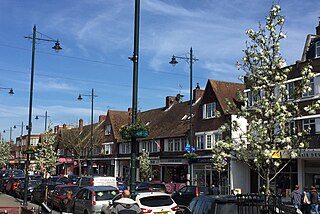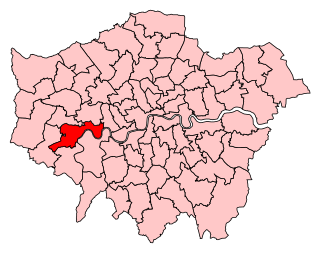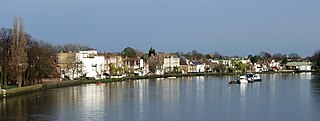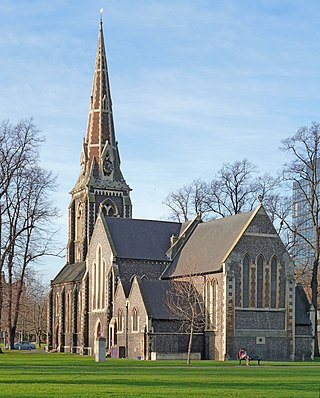
Chiswick is a district of west London, England. It contains Hogarth's House, the former residence of the 18th-century English artist William Hogarth; Chiswick House, a neo-Palladian villa regarded as one of the finest in England; and Fuller's Brewery, London's largest and oldest brewery. In a meander of the River Thames used for competitive and recreational rowing, with several rowing clubs on the river bank, the finishing post for the Boat Race is just downstream of Chiswick Bridge.

The London Borough of Hounslow is a London borough in West London, England, forming part of Outer London. It was created in 1965 when three smaller borough councils amalgamated under the London Government Act 1963. It is governed by Hounslow London Borough Council.

Turnham Green is a London Underground station in Chiswick of the London Borough of Hounslow, west London. The station is served by the District and Piccadilly lines although currently Piccadilly line trains normally stop at the station only at the beginning and end of the day, running through non-stop at other times. To the east, District line trains stop at Stamford Brook and Piccadilly line trains stop at Hammersmith. To the west, District line trains run to either Chiswick Park or Gunnersbury and Piccadilly line trains stop at Acton Town. The station is in both Travelcard Zone 2 and Zone 3.

Whitton is an area in the London Borough of Richmond upon Thames, England. Historically, the boundaries of Whitton were the north-western part of Twickenham manor, bounded internally by the sections of the River Crane and the Duke of Northumberland's River.

Chiswick railway station is a railway station within the Grove Park residential area of Chiswick in the London Borough of Hounslow. The station is on the Hounslow Loop Line, and all trains serving it are operated by South Western Railway. Journey time into London Waterloo is approximately 25 minutes and Clapham Junction 15 minutes. The station is in Travelcard Zone 3.

Brentford and Isleworth is a constituency represented in the House of Commons of the UK Parliament. It forms the eastern part of the London Borough of Hounslow. Since 2015, it has been represented by Ruth Cadbury of the Labour Party.

Hogarth's House is the former country home of the 18th-century English artist William Hogarth in Chiswick, adjacent to the A4. The House now belongs to the London Borough of Hounslow and is open to visitors as a historic house museum free of charge. Chiswick is now one of London's western suburbs, but in the 18th century it was a large village or small town quite separate from the metropolis, but within easy reach of it. Today the house is a Grade I listed building.

Heston and Isleworth was a local government district of Middlesex, England from 1894 to 1965.

Chiswick was a local government district in the county of Middlesex, England from 1858 to 1927. It was part of the London postal district and the Metropolitan Police District.

Strand-on-the-Green is one of Chiswick's four medieval villages, and a "particularly picturesque" riverside area in West London. It is a conservation area, with many "imposing" listed buildings beside the River Thames; a local landmark, the Kew Railway Bridge that crosses the River Thames and the Strand, is itself Grade II listed. Oliver's Island is just offshore.

Turnham Green is a public park on Chiswick High Road, Chiswick, London, and the neighbourhood and conservation area around it; historically, it was one of the four medieval villages in the Chiswick area, the others being Old Chiswick, Little Sutton, and Strand-on-the-Green. Christ Church, a neo-Gothic building designed by George Gilbert Scott and built in 1843, stands on the eastern half of the green. A war memorial stands on the eastern corner. On the south side is the old Chiswick Town Hall.
Acton Green is a residential neighbourhood in Chiswick and the London Borough of Ealing, in West London, England. It is named for the nearby Acton Green common. It was once home to many small laundries and was accordingly known as "Soapsuds Island".

Dukes Meadows is a riverside park in Chiswick, London. The land was bought by the council in 1923, and the park was opened in 1926. It is cared for by the Dukes Meadows Trust. The area is home to the Chiswick Farmers' Market, which helps to pay for the park's maintenance. From 2022 the Dukes Meadows Footbridge will form part of the Thames Path.

Christ Church, Turnham Green is a Grade II listed Anglican church sited on the eastern half of Turnham Green in Chiswick, west London. The church and the green on which it sits are local landmarks, and are considered of special historic interest by the London Borough of Hounslow.

Acton Town Hall is a municipal building in High Street, Acton, London. It is a Grade II listed building.

Chiswick Mall is a waterfront street on the north bank of the river Thames in the oldest part of Chiswick in West London, with a row of large houses from the Georgian and Victorian eras overlooking the street on the north side, and their gardens on the other side of the street beside the river and Chiswick Eyot.

Old Chiswick is the area of the original village beside the river Thames for which the modern district of Chiswick is named. The village grew up around St Nicholas Church, founded c. 1181 and named for the patron saint of fishermen. The placename was first recorded c. 1000 as Ceswican. In the Middle Ages the villagers lived by fishing, boatbuilding, and handling river traffic. The surrounding area was rural until the late 19th century.

Chiswick High Road is the principal shopping and dining street of Chiswick, a district in the west of London. It was part of the main Roman road running west out of London, and remained the main road until the 1950s when the A4 was built across Chiswick. By the 19th century the road through the village of Turnham Green had grand houses beside it. The road developed into a shopping centre when Chiswick became built up with new streets and housing to the north of Old Chiswick, late in the 19th century. There are several listed buildings including public houses, churches, and a former power station, built to supply electricity to the tram network.



















